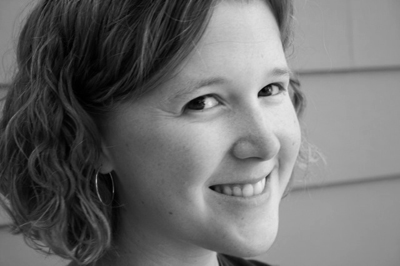This piece is part of an on-going blog series called Plurality 2.0 (watch video here). Full schedule of guest authors throughout April and May is available here.
Sarah Walker Cleaveland is a PhD student in Christian Spirituality at the Graduate Theological Union. She also tutors, teaches 2nd and 3rd grade Sunday School, volunteers with hospice, and walks the dog. In her spare time, she’s married to Adam. Find more info here.
 For me, the temptation is to make God small, controllable. With so much uncertainty in the world, I really want to know who God is, what God requires and how to be faithful. I’d like rules, and a schedule, and a to-do list for my faith that would guarantee outcomes. I admire the people who appear to have their lives and their faith “together;†you know, the ones who are always calm and collected, wise and prophetic. I want to be like that and I’d like a straight course with easily identifiable landmarks and quantifiable tasks. These, oh Interwebs, are my secret desires.
For me, the temptation is to make God small, controllable. With so much uncertainty in the world, I really want to know who God is, what God requires and how to be faithful. I’d like rules, and a schedule, and a to-do list for my faith that would guarantee outcomes. I admire the people who appear to have their lives and their faith “together;†you know, the ones who are always calm and collected, wise and prophetic. I want to be like that and I’d like a straight course with easily identifiable landmarks and quantifiable tasks. These, oh Interwebs, are my secret desires.
Sadly, or not so sadly depending on your point of view, what sticks with me about God, when I actually take the time to read the stories we tell about the Holy rather than fashioning Divinity after my own desires, is God’s pesky tendency to show up in unexpected places. I am particularly found of the story told about Moses in Exodus 33:12:
“Moses said to the Lord, “See, you have said to me, ‘Bring up this people’; but you have not let me know whom you will send with me. Yet you have said, ‘I know you by name, and you have also found favor in my sight.’ Now if I have found favor in your sight, show me your ways, so that I may know you and continue to find favor in your sight. Consider too that this nation is your people.†God said, “My presence will go with you, and I will give you rest.†And Moses said to God, “If your presence will not go, do not carry us up from here. For how shall it be known that I have found favor in your sight, I and your people, unless you go with us? In this way, we shall be distinct, I and your people, from every people on the face of the earth.â€
I love this story of Moses because I can totally see him slyly trying to push God to the limits – almost testing God as you might someone you’re considering dating or moving in with – it’s the “are you for real†question that is central to any relationship – are you really going to do what you’ve said or are you going to leave me stranded out here looking like a fool?
God doesn’t completely give in to Moses, but God does allow Moses to see his backside (which was the source of many off-color jokes in seminary). This, I think, is significant.
It would be easier if we could see God coming. If we could know in advance where God was going to be and when and for how long; then we could get ready, be prepared, know what to expect. But God doesn’t always let us see God coming. More often, as with Moses, we are in the position of following God’s trail into the future.
This, for me, is the crux of the plurality debate. Because God shows up in unexpected places, because we follow God into the future, because the Spirit is free to blow where it will, and because Jesus included people outside the religious establishment, I can’t wall off the boundaries of salvation or religion or faith. To be honest, I don’t know who will be in and who will be out in the final count, if there ever is one, but in the meantime, I’m going to err on the side of love, trusting that God is going places even I can’t anticipate, including people I would never have expected, and loving in ways far beyond my imagination.